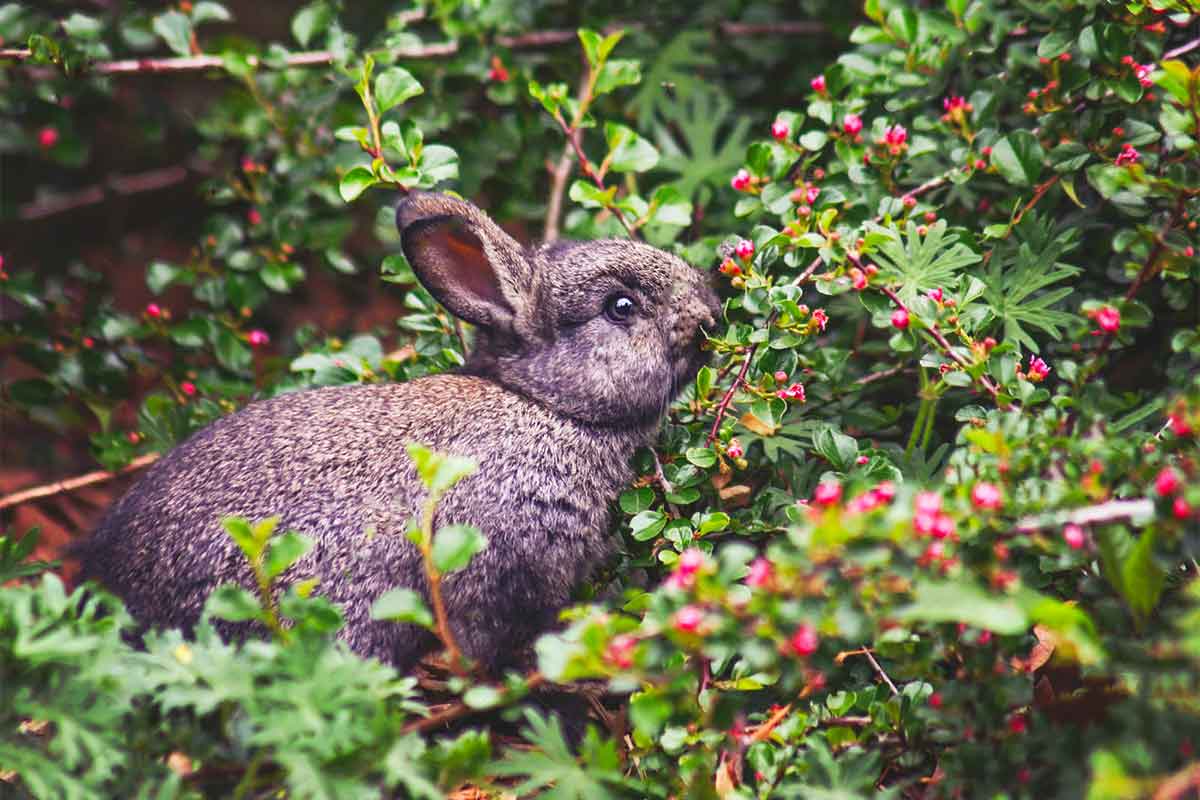Blueberries are filled with nutritional goodness.
In humans, they are seen as a superfood.
But can rabbits eat blueberries with the same positive outcome?
You will be happy to know they can in fact eat blueberries, but there is more to know before you do, so read on.
Yes, Rabbits Can Eat Blueberries
Not only can rabbits eat blueberries, but they will probably love them and come running back for more.
But that is where you have to play bad cop and limit how many they eat as they can have an unhealthy side too if they eat too many.
They should not be a major part of your pet bunny’s diet, but a once in a while treat to enjoy.

Age Matters!
Baby and juvenile rabbits should not be fed blueberries at any time. Only adult rabbits should be offered blueberries as an occasional treat.
Related: Can you feed a rabbit cherries?
Introducing Blueberries To A Rabbit
You should never give your rabbit any new foods in a large amount.
It is super important to ensure their little bellies can handle the new food so it is best to see how they respond by giving them a small bit.
Start with a half of a blueberry to start then wait a few hours and see how your rabbit does.
If they are having normal bowel movements with little hard poop pellets, then you can try feeding them one whole blueberry.
Monitor them again and see how they do.
If you notice at any point their bowel movements become too soft, the you know their digestive system may not be able to handle blueberries.
At this point you should rule out blueberries as a future treat.
How Often Can I Feed My Rabbit Blueberries?
There is sugar in blueberries as well as Vitamin C.
In small amounts neither of these will cause a huge issue for your bunny.
But too much of either of these may cause some ailments.
Veterinarians normally recommend no more than a couple of blueberries (meaning 1-3 depending on size) only once a week.
Health Benefits Of Blueberries For Rabbits
There are a few great things about feeding blueberries to your bunny.
To start they are low in sugar and calories, but the nutrients they contain are where the magic really happens.
Vitamin K
Vitamin K is important to help transport nutrients throughout your bunny’s body.
It has also been shown to improve some injuries that bunnies have received.
Immunity Improvements
Blueberries contain something called “pterostilbene” which has been shown to have a positive affect on the immune system.
It is the primary antioxidant in blueberries and offers a variety of health benefits including lower cholesterol and reducing the risk of cancer.
The Brain Boost
The nutrients in blueberries can have a positive impact on the brain.
In studies it has been found that these nutrients can inhibit mental deterioration which means your bunny can remain mentally alert for years to come.
Blueberries include the following vitamins and nutrients:
- Vitamin K
- Vitamin C
- Manganese
- Vitamin B6
- Copper
- Riboflavin
- Pterostilbene
- Folate
- Niacin
- Zinc
- Iron
Related: Feeding a rabbit cabbage?
Why Blueberries Might Be Bad For Rabbits
While blueberries do offer many nutrients and goodness, there are some reasons you should not feed your rabbit too many of them.
- While most rabbits will not have any side affects from 1 or 2 blueberries, some may have trouble digesting them or get diarrhea.
- Never give your rabbit cooked blueberries in any form. They rely on fresh and raw food for nutrients and their stomachs are not meant to digest processed or cooked food.
- Pesticides that has been sprayed on fruits that has not been thoroughly washed off can cause issues.
- Rotten blueberries can also make your rabbit sick, so be sure your blueberries are fresh.
- Baby and young adult rabbits do not have the same digestive system of their older relatives. So blueberries can be dangerous until they are about 3-4 months of age.
Can A Rabbit Eat Other Parts Of A Blueberry Plant?
While the most common part of the blueberry plant is the blueberry, there are other pieces of the plant your bunny may enjoy.
The leaves of the blueberry plant might even appeal more to some bunnies than the blueberry itself.
There is also the stem which can be a good option for a chew toy as it is firm and woody in nature.
It’s important to make sure the blueberry plant has not been treated with any chemicals and are fresh.
Keep the amounts small to start in the event they get an upset belly.
Wild rabbits often eat these elements because they are often easier to access than the blueberries themselves.
Related: Do wild rabbits hibernate?
Safely Feeding Blueberries To Your Rabbit
It is incredibly important to make sure you safely feed your rabbits any fresh fruit or vegetables.
Before feeding your rabbit blueberries, be sure to do the following.
- Make sure you buy organic or from a local farmers market to ensure the blueberries have not been sprayed with pesticides.
- Wash them thoroughly.
- Feed a half of one to start, only feed a couple at the most once you know your rabbit can digest them well.
- Be sure the blueberries are fresh and free from any kind of rot.
Frequently Asked Questions
How many blueberries can rabbits eat?
Rabbits can safely eat 1-2 large or 2-3 small blueberries once a week.
Can baby bunnies have blueberries?
No, baby bunnies or young bunnies cannot have blueberries. You should wait until your rabbit is about 3-4 months before introducing blueberries to their diet.

